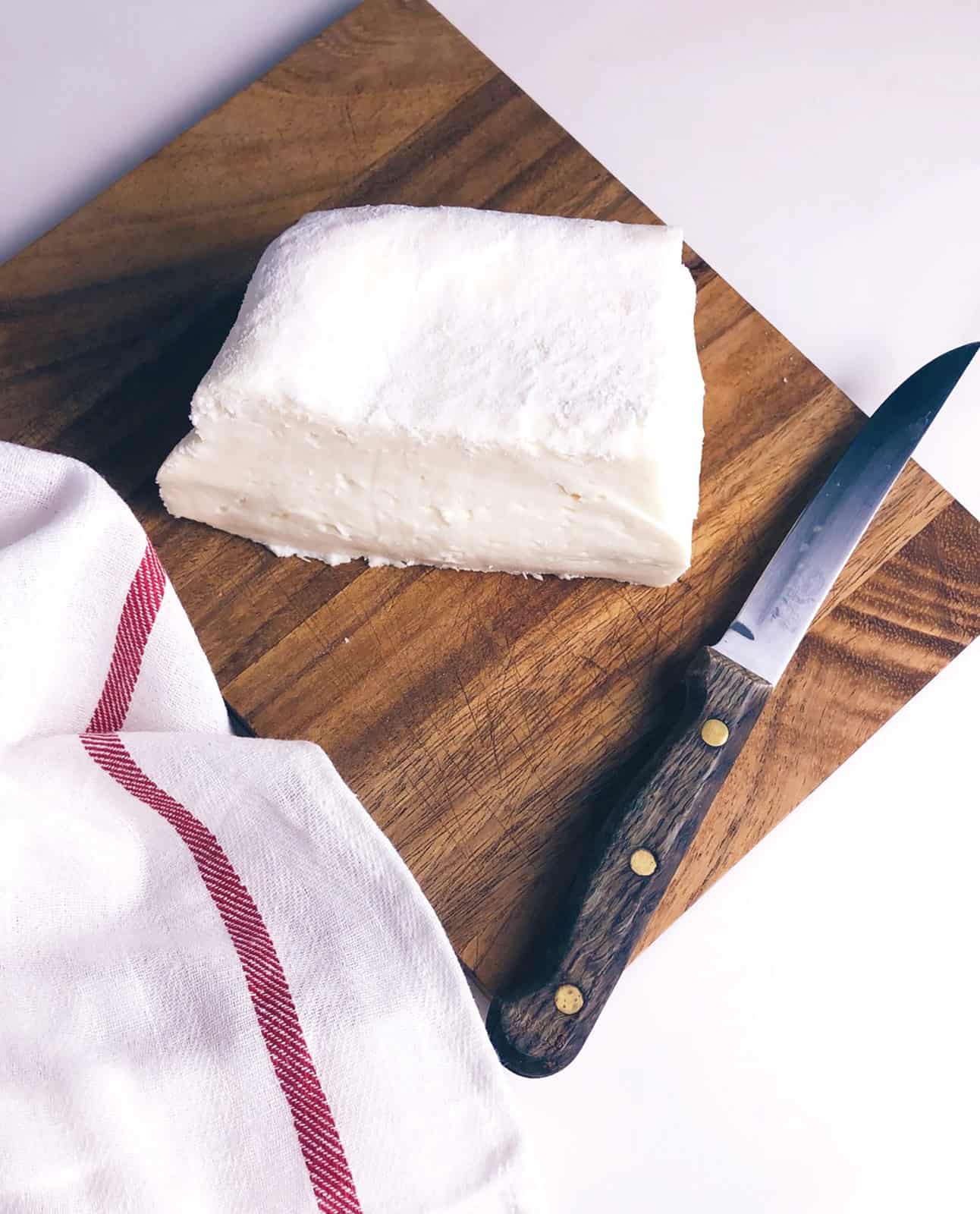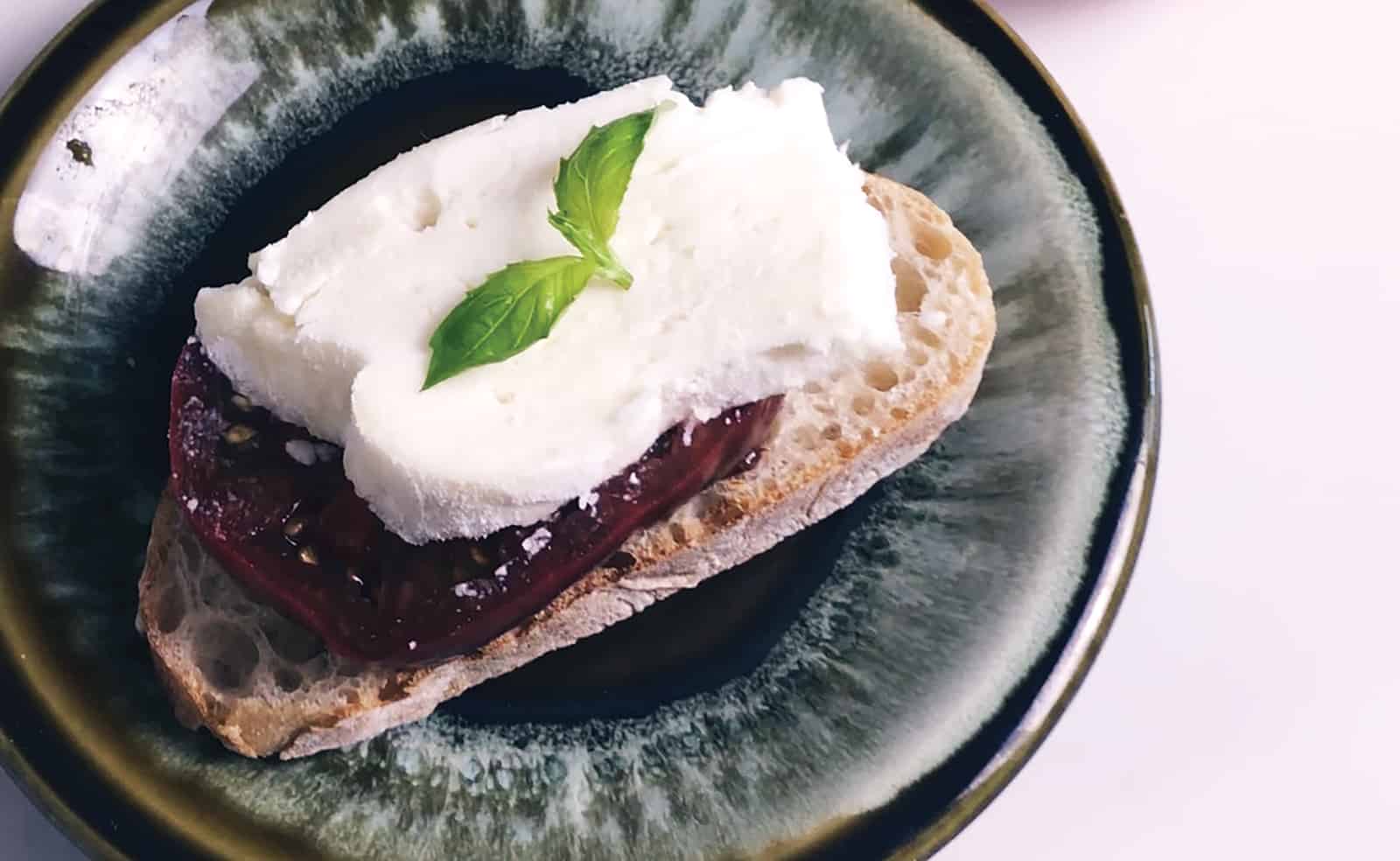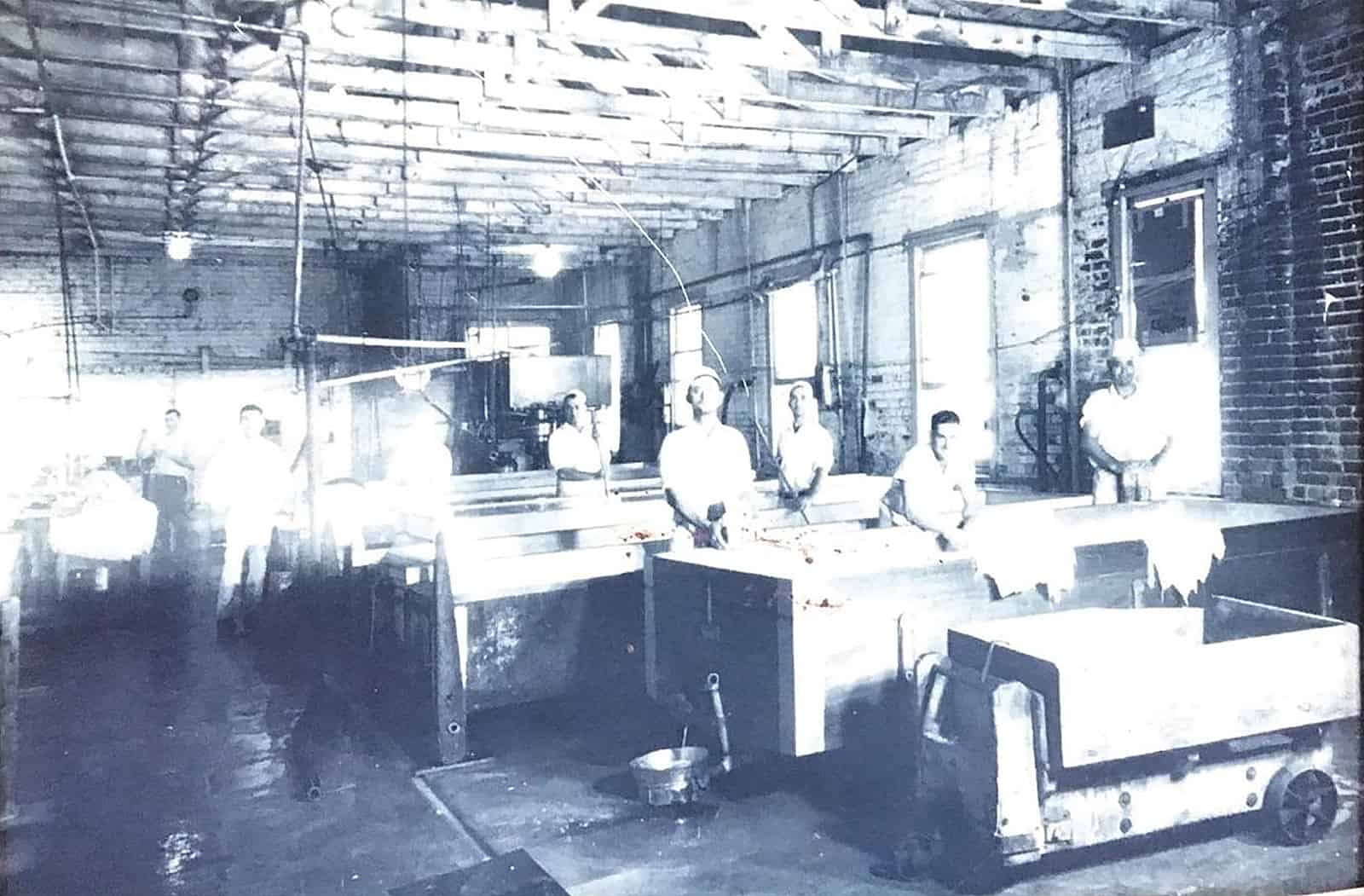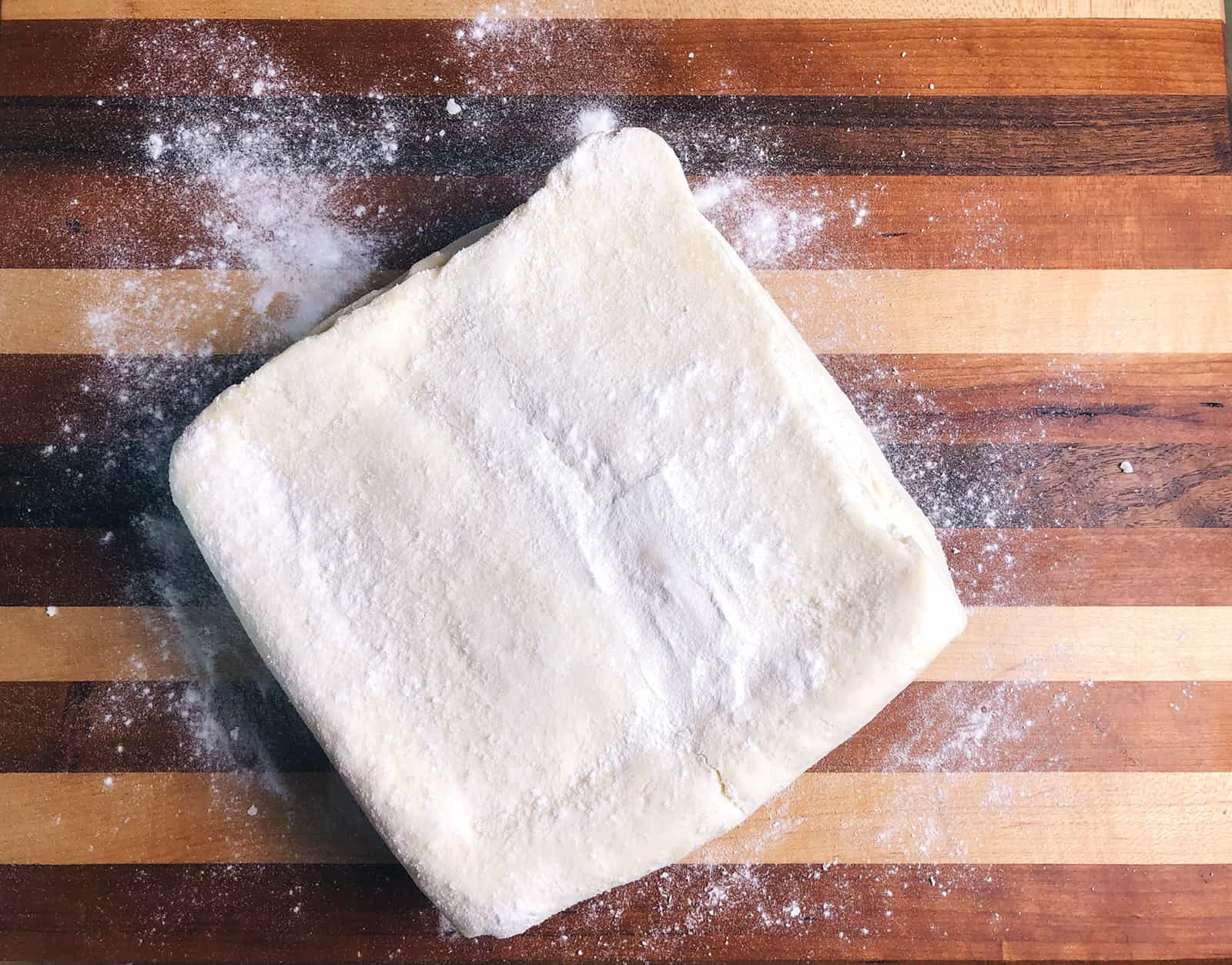
I’m driving through dense morning fog in California’s San Joaquin Valley, slowly maneuvering my car, searching for road signs and landmarks scribbled down on the back of an old envelope. My eyes spot the sun, a white orb only slightly brighter than the dewy air around it. I can look directly at it without squinting.
This hazy valley is the heart of California Big Ag country. It’s home to the World Ag Expo, the largest milk processing center in California, and one of the largest Kraft cheese factories in the country. All here seems superlative: The trucks are the dirtiest, the farms have the biggest equipment, the fog is the foggiest, and the cows are the happiest—or so it is marketed.
Yet in the midst of all of this industrial agriculture, a small-framed, older man toils away making small batches of cheese in an austere room behind an unmarked door inside of a repurposed warehouse on a small, family-owned kiwi orchard. That man is Franklin Peluso, owner of Mid Coast Cheese Company. He is the only remaining maker of original-style Teleme, a hefty stracchino cheese with a rich, velvety texture. Not only is Franklin’s Teleme (pronounced tell-uh-may) one of California’s oldest and most legendary cheeses—it’s also, increasingly, its rarest.

Franklin Paluso (right) and his father, Frank, in 1992.
For over a year, I’ve been researching Teleme, Franklin Peluso, and his family’s intimate ties to this unique cheese. My goal? To nominate Teleme for an Ark of Taste designation, a Slow Food Foundation for Biodiversity project that catalogs distinctive foods with rich histories that are at risk of extinction. While learning about Teleme’s history and getting to know Peluso, it’s become clear that his wisdom of craft and firsthand knowledge of California’s cheese history are inspiring—and worthy of being preserved.
I think I’ve reached groupie status, I tell myself while crisscrossing the country roads, looking for the last road sign pointing me toward Teleme. And I’m not its only devotee: Teleme’s mystical story and larger-than-life personality have earned it a cult following in California. The beauty of Teleme—as I often profess to anyone willing to listen—is that it is at once a piece of history, an American Original, an immigrant story, and a culinary workhorse, a cheese whose stark simplicity balks at pretension. I finally encounter the hand-painted roadside sign that reads “CHEESE KIWI.”
After I knock on three different doors, Franklin pokes his head out. He says hello and quickly ushers me inside, lest the barn cats leap indoors. He settles immediately into his cheesemaking routine, one that he has mastered over more years than I’ve been alive. After the early hours of pasteurization and production setup lapse, it comes time to inoculate and set the milk—the secret part of the family recipe. Peluso politely but intently suggests that this would be a great time to go out for some coffee, his treat. I take the hint. So does his son, who takes over.

Photograph by Rachel Kleine
As Peluso drives us into town, I notice that, like the way Peluso works and speaks, his driving is precisely timed and thoughtful. He shifts into recounting tales of Teleme.
“Teleme has a long history in California,” Peluso says. “Other companies made it at different times, but my family has made it since the beginning—and it was my grandfather who more or less created it.”
Peluso learned to make cheese from his father who was taught by his father; a secret recipe passed between generations. In 1927, Peluso’s grandfather, Giovanni, was inspired by the success of a cheese called telemea made by Greeks in the Bay Area, so he played around with re-engineering it. Despite the similar name, Giovanni’s cheese was distinct; while telemea was more like high-moisture Jack, Giovanni re-envisioned it as a ripened stracchino reminiscent of those made in Northern Italy. And there was already a market awaiting it: San Francisco’s swelling Italian population.

The creamery, circa 1930.
Through the area’s network of Italian delicatessens, Teleme—adopted by a growing number of nearby cheesemakers—became a household staple and a commercial success. Production was further bolstered during World War II, when cheese imports from Italy were banned. A well-integrated part of Northern California’s food fabric, it even weathered the postwar consumerism boom, remaining a staple in home–cooked dishes like polenta.
Production of Teleme waxed and waned among a number of local creameries throughout the 1960s and ’70s. Gradually, the cheesemakers who knew how to make the cheese retired, often without passing on their knowledge. Even Frank Peluso, Franklin’s father, abandoned Teleme to focus on other cheeses, like mozzarella, that were easier to make.
In 1980, Peluso joined his father in the family cheesemaking business. Within a year, a local cheese broker advised the father-son team that if they reintroduced the family’s original Teleme cheese he could sell 100 percent of it. “No one was making good Teleme at the time,” says Peluso, who grew up eating his father’s and grandfather’s cheese. So, the duo obliged, resurrecting the recipe and staying true to traditional methods. The broker’s hunch proved true, and demand for the cheese spiked. Food writers of the ’80s and ’90s rediscovered Teleme for a new generation, praising its approachability, uniqueness, and myriad culinary uses.
Today, Peluso is teaching his son, Adam, the ropes. “Teleme is a very difficult cheese to make correctly and consistently because it is so high moisture—it doesn’t get to age out the way most soft-ripened cheeses do,” Peluso says. I suspect that part of what makes Franklin’s Teleme so unique, though, is what happens after it’s made.

Photograph by Rachel Kleine
Once they’ve been formed and pressed, young squares of curd are left to mellow out for a few days before being dusted with rice flour, a tradition that harkens back to Northern Italy. Peluso explains that rice flour dries the rindless edges of the squares without becoming hard or gummy. The Pelusos have always sourced their rice flour from nearby Koda Farms, an allied exemplar of multi-generational, immigrant–founded, San Joaquin Valley agriculture. It’s Teleme’s powdery-lipped whisper at terroir: a romantic pairing that rouses at least spirit-of-place.
Peluso’s young, freshly floured Telemes look like slabs of bread dough waiting to be proofed. Their aroma isn’t all that different, either. After being wrapped in white butcher paper and placed in individual boxes, the cheeses mature for three weeks before being released to market. When they reach shops, their floury, off-white surfaces look and feel a bit like mochi, or giant blocks of marzipan rolled in powdered sugar. And they’re every bit as appetizing. “Teleme is soft and looks kind of pudgy; big but delicate,” Peluso says. “And it takes a good cheesemonger to know how to handle and sell it.”
The slab’s size—weighing around 7 pounds—is a relic by modern soft–cheese standards; a vision of the past when Teleme’s main destinations were Italian delis where several pieces would be cut up and sold each day. Franklin recalls that when he was young, Teleme was even larger, made as 11-pound blocks for sandwich shops that sliced it right onto bread. What a dream, I think to myself. Now Franklin is coping with the growing demand for small-format cheeses that sell individually to the grab-n-go set. “Today’s market wants every cheese to resemble commodity brie,” quips Peluso.
There was a push over the years to make Teleme a bit cheaper by cutting corners, Peluso explains—like omitting the rice flour and packaging directly in vacuum-sealed plastic. Although he now makes a smaller version and is experimenting with a washed rind rendition, a priority has been staying true to Teleme’s roots. “Our family has always insisted on making the original, traditional-style Teleme and selling it under our name,” Peluso says. At Rainbow Grocery in San Francisco, longtime cheese buyer Gordan Edgar makes sure to stock the cheese in his case at all times. “Teleme is a Northern California tradition, and we sell it that way,” he says.
But the cherished old-school cheese now faces a dubious future. Teleme continues to hold a special place in Northern Californians’ kitchens and family recipe books—but with no one to make it, the cheese will fade to museum status. Peluso—in his mid-70s—is the last person alive who knows how to make authentic Teleme. He insists that he will keep going, while acknowledging that the cheese is both difficult and captivating “Making it has been a constant challenge, and that intrigues me,” he says. Peluso stops short of voicing Teleme’s imminent expiration from cheese cases, instead expressing hope that his son will choose the same path as him, his father, and his grandfather.
For now, the cheese shops and Italian delis that still stock Franklin’s Teleme Cheese are the stewards of a local tradition so unique it defies definition.“[It’s like] crescenza but with an amazing chewy rind; the inside of Taleggio but milkier; the best Monterey Jack times 100,” says Edgar, attempting to characterize the singular American Original. “There really is no other cheese like it.”




Last month I found Teleme again. Tomales Bay brand, and I was excited to see Teleme for sale again. When the scale showed a little over a pound the clerk told me $30.53. Well I had the clerk put the cheese back in the case because it is just to expensive now. I knew that teleme was special having loved it in the past. But at twice the price I decided not to buy it.
Ok, so I learned of your story such as no longer having a place to make teleme. Or you sold the cheese brand to a California central valley producer. I learned you may have moved out of state etc. All the excuses which may be expressed by you to make your old customers feel sorry for you etc.
However, your business practices must have been defective. Why didn’t you own the plant? Why do you selfishly keep the recipe secret? Oh the tradition of keeping a recipe secret to die with you when you pass on… What benefits you to keep the recipe in your head so the cheese as you produced it dies with you? Feeling important, selfish ego, getting even with the world as you may know it?
I understand that you may be teaching your son to make the cheese. I commend you if you are teaching your son, and hopefully your son is seriously focused on carrying on your family’s tradition. But, instead of renting a space consider owning your facility. And locate that facility near the best milk producers, and located close to transportation. And, then the focus can be on your cheese business rather than the landlord’s dictating to you his/her rules you have to follow because you are only added profit from efficient equipment down time rental.
It could be said that you were a little cheese producer not committed to do any business more than necessary. You just wanted to make a good living, and spend your profits, not investing in building your business, and feeling important because you alone held the secrets of teleme. All good of course, but your Teleme was very special. You knew Teleme had a following. And I know that whenever I served Teleme my favorite way with fresh sliced apples and freshly ground pepper all who ate it thought it was a wonderful cheese. Yet, even though you knew it could sell you continued to keep it slow moving hidden in special cheese sections buried between better monterey jack, brie, and other white cheeses. Never did you do promotion sampling to introduce the cheese to new possible users. Never did you package the cheese telling its California history. The only promotion Teleme has was word of mouth introductions by your customers.
So, if you just want to have your son run the cheese business as you did why not just consider retiring. Let the Teleme recipe, and its production processes die happily with you. Had I never enjoyed Teleme I would not know what I now miss. It is really to bad that it seems a selfish person with little business ambition was given the possible opportunity of having a product with so much history, pride and potential. It was a missed opportunity for you, and now again an opportunity for your son. Teleme cheese may have a future.
Russell